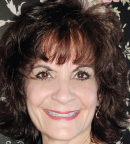Cancer was a disease I feared until 3 years ago, when I was diagnosed with gastric cancer. After receiving the diagnosis, I knew I didn’t have any time to indulge in fear; I had to take action if I was going to survive. In hindsight, symptoms of the cancer, including some fatigue and indigestion, started showing up a year before my diagnosis, but they were so vague that they were easily explained by the long days I was working and the medication I had begun taking for type 2 diabetes. In fact, it may have taken even longer to detect the cancer if it had not been for a diagnosis of type 2 diabetes in 2015.

Denise Leprine
Frequent monitoring of my blood glucose levels during that year showed that although the medication I was taking was effective in maintaining good control of my blood sugar, my hemoglobin levels were starting to dip. By September 2016, my hemoglobin count was so dangerously low—6.4 g/dL—my doctor called to tell me I had to meet him at the emergency room for additional tests. After admission to the hospital, I received two blood and iron transfusions, which raised my hemoglobin to normal levels, but more blood tests and imaging scans failed to determine the cause of the problem.
Hiding in Plain Sight
When my doctor suggested I have a colonoscopy and endoscopy, I suspected he thought I had cancer, most likely colorectal cancer. My mother had had breast cancer when she was 42, so there was a history of cancer in our family, and it wouldn’t have been shocking to be diagnosed with cancer. I was prepped for both a colonoscopy and endoscopy, but the endoscopy had to be stopped soon after the start of the procedure because there was food in my stomach. The colonoscopy was also cancelled.
However, even though the endoscopy was never fully completed, the gastroenterologist was able to get enough of a view of my digestive tract to declare that my stomach looked clear of any obstruction. He did notice a peptic ulcer at the bottom of my stomach and was able to retrieve some tissue for a biopsy, which tested negative for cancer.
A few days later, I was able to fully complete both the colonoscopy and endoscopy procedures. Although my colon and digestive track did not have any lesions, this time the gastroenterologist spotted a suspicious mass in the ulcer and retrieved additional tissue for a biopsy. And that is where the cancer was hiding.
Getting to a Cure
Being diagnosed with gastric cancer was surprising because I have none of the usual risk factors for the disease. I have no genetic link to the cancer, am not Helicobacter pylori–positive, have never smoked, and eat a healthy diet, so the diagnosis is baffling to me. Fortunately, the cancer was completely contained within my stomach. My oncology team recommended four rounds of neoadjuvant chemotherapy, which included a combination of capecitabine and oxaliplatin, surgery to remove the ulcer and about one-third of my stomach, followed by four more rounds of the combination chemotherapy. The goal of the treatment, said my oncologist, was to achieve a cure.
In October 2019, I passed the 2-year mark of the end of my treatment, and I remain cancer-free.
“I couldn’t have asked for a more compassionate team of oncologists and nurses.”— Denise Leprine
Tweet this quote
Living With Renewed Purpose
I have always been a pretty positive person. I don’t take life for granted and have been successful at striking a good balance between my personal and professional lives. But having cancer has irrevocably changed my life. I look at life with a different lens now—one that is focused on being in the moment, because it is the only time I’m assured of having, and time has become very precious.
When my mother was diagnosed with breast cancer at such a young age, I became aware of how fragile life is. But I didn’t really appreciate how fleeting it could be until I had my own cancer diagnosis. I’m a person of faith, so I decided if it was meant for me to be well, I wouldn’t waste this time I’ve been given. I wanted to pay my good fortune forward and became involved with Debbie’s Dream Foundation: Curing Stomach Cancer, a nonprofit organization that raises funding for research in gastric cancers. There I mentor other survivors and help raise awareness of this cancer.
I know I wouldn’t have fared so well if it hadn’t been for a terrific medical team. I remember being so scared at the first meeting with my oncologist because I was afraid I wouldn’t understand what he was saying. But that impression couldn’t be farther from the truth. I couldn’t have asked for a more compassionate team of oncologists and nurses.
Each day now is a gift, and I live it with intent and purpose—and without fear. ■
Ms. Leprine, a sales and marketing manager at Verizon, lives in New Hyde Park, New York.
Editor’s Note: Columns in The Patient’s Corner are based solely on information The ASCO Post received from patients and should be considered anecdotal.

